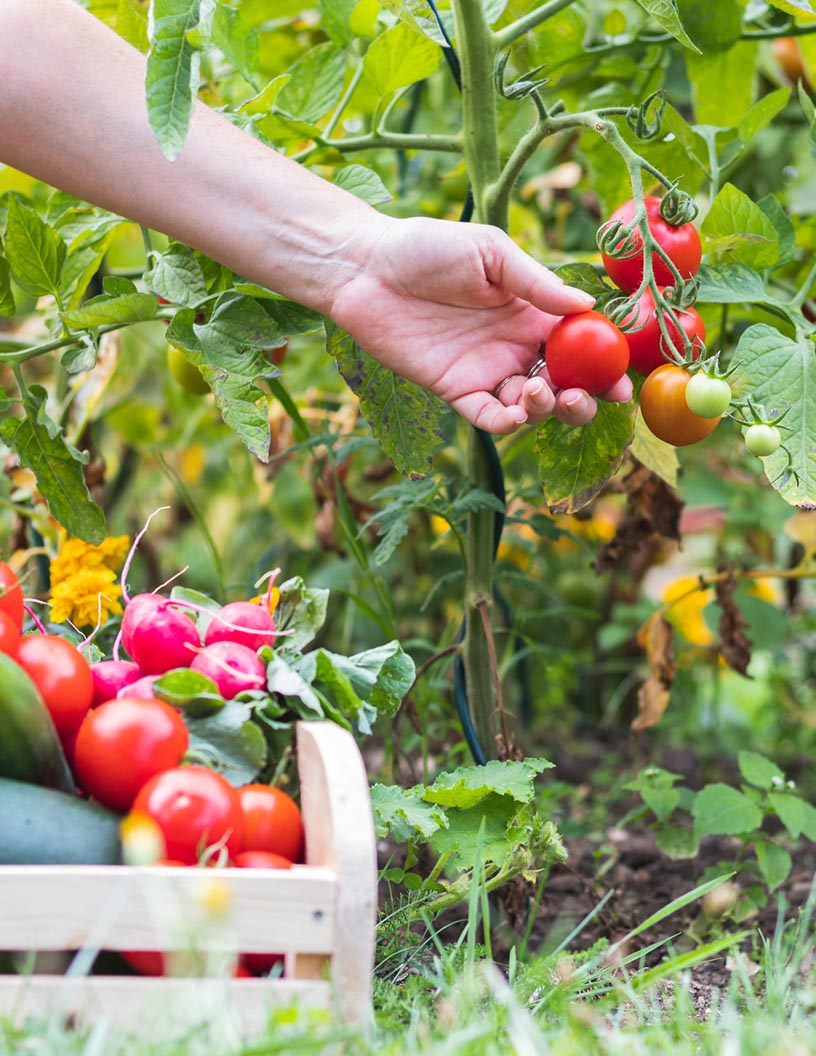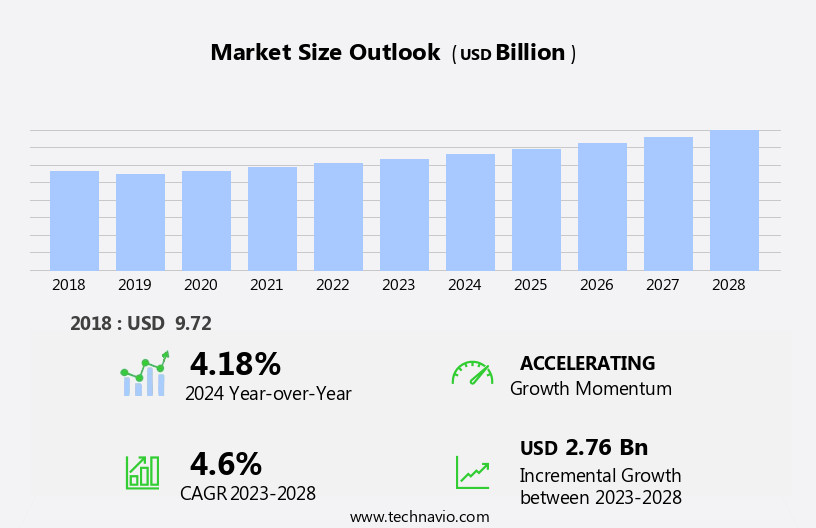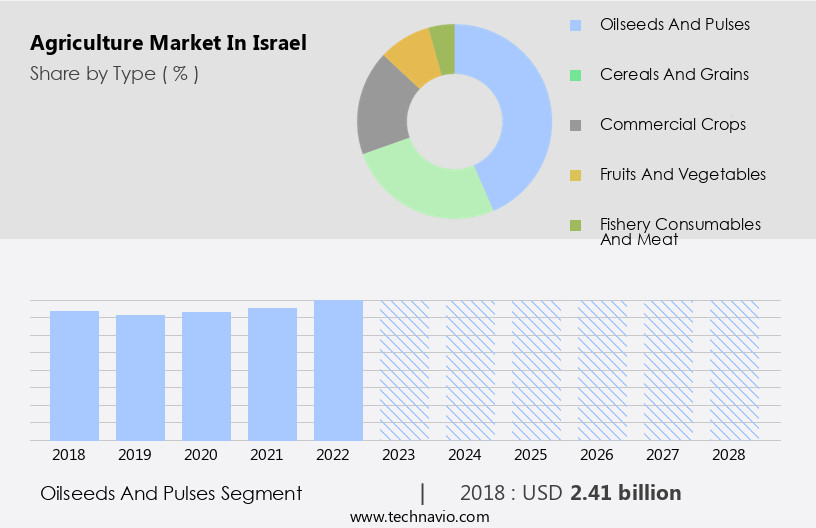Israel Agriculture Market Size 2024-2028
The israel agriculture market size is forecast to increase by USD 2.76 billion at a CAGR of 4.6% between 2023 and 2028.
What will be the size of the Israel Agriculture Market during the forecast period?
How is this market segmented and which is the largest segment?
The market research report provides comprehensive data (region-wise segment analysis), with forecasts and estimates in "USD billion" for the period 2024-2028, as well as historical data from 2018-2022 for the following segments.
- Type
- Oilseeds and pulses
- Cereals and grains
- Commercial crops
- Fruits and vegetables
- Fishery consumables and meat
- Distribution Channel
- Supermarket
- Convenience stores
- E-commerce
- Geography
- Israel
By Type Insights
- The oilseeds and pulses segment is estimated to witness significant growth during the forecast period.
Israel's agriculture sector experiences growth, particularly In the oilseed and pulses segment, driven by expanding cultivation and evolving consumer preferences. With a focus on health and fiber-rich, low-fat diets, pulses have gained popularity. As a result, pulses are increasingly used in various food products, including pastas, bakery items, snacks, and meat substitutes. Israel imports a significant portion of its pulses from countries like India, China, and Indonesia, making it the world's largest importer. This trend is expected to continue as consumers prioritize healthy eating habits. Agricultural technologies, such as precision agriculture, leak prevention, and drip irrigation, are crucial in addressing the arid conditions and limited water resources in Israel.
The agricultural output of Israel includes fruits like tomatoes, carrots, turnips, grapefruit, bananas, dates, avocados, pomegranates, almonds, and commercial crops such as apples, cherries, plums, nectarines, grapes, strawberries, persimmon, and turf and ornamentals.
Get a glance at the market share of various segments Request Free Sample
The Oilseeds and pulses segment was valued at USD 2.41 billion in 2018 and showed a gradual increase during the forecast period.
Market Dynamics
Our researchers analyzed the data with 2023 as the base year, along with the key drivers, trends, and challenges. A holistic analysis of drivers will help companies refine their marketing strategies to gain a competitive advantage.
What are the key market drivers leading to the rise in adoption of Israel Agriculture Market?
Growth of organized retail sector is the key driver of the market.
What are the market trends shaping the Israel Agriculture Market?
Agriculture revolutionized by artificial intelligence and robotics is the upcoming trend In the market.
What challenges does Israel Agriculture Market face during the growth?
Reducing arable land in Israel is a key challenge affecting the market growth.
Exclusive Israel Agriculture Market Customer Landscape
The market forecasting report includes the adoption lifecycle of the market, covering from the innovator’s stage to the laggard’s stage. It focuses on adoption rates in different regions based on penetration. Furthermore, the report also includes key purchase criteria and drivers of price sensitivity to help companies evaluate and develop their market growth analysis strategies.
Customer Landscape
Key Companies & Market Insights
Companies are implementing various strategies, such as strategic alliances, market forecast partnerships, mergers and acquisitions, geographical expansion, and product/service launches, to enhance their presence In the market.
The market research and growth report includes detailed analyses of the competitive landscape of the market and information about key companies, including:
- Afimilk Ltd.
- Agro Shelef Ltd
- AquaMaof Aquaculture Technologies Ltd.
- BASF SE
- Bayer AG
- Bogar Bio Bee Stores Pvt. Ltd.
- CropLife International AISBL
- Ginegar Plastic Products Ltd.
- Groupe Limagrain
- Hishtil
- Kaiima Ltd.
- miRobot
- Orbia Advance Corp. S.A.B. de C.V.
- Palram Industries Ltd
- Rivulis Irrigation Ltd.
- SOCIETE SAS
- Strauss Group Ltd.
- Syngenta Crop Protection AG
- The Israeli Research and Development Co. Ltd.
Qualitative and quantitative analysis of companies has been conducted to help clients understand the wider business environment as well as the strengths and weaknesses of key market players. Data is qualitatively analyzed to categorize companies as pure play, category-focused, industry-focused, and diversified; it is quantitatively analyzed to categorize companies as dominant, leading, strong, tentative, and weak.
Research Analyst Overview
Agriculture in Israel is a significant sector, characterized by its innovation and adaptation to the unique arid conditions. Commercial crops In the region include grains, cereals, oilseeds, pulses, and a diverse range of horticultural products such as vegetables, fruits, and commercial crops. The agricultural industry in Israel is driven by a focus on maximizing the use of natural resources, particularly water, through advanced agricultural technologies. Israel's agricultural output is influenced by various market dynamics. The country's agricultural sector is subject to both domestic and global market trends. Domestic production is shaped by consumer needs and preferences, as well as government policies and initiatives.
On the global stage, Israel's agricultural industry is influenced by international trade agreements, commodity prices, and supply and demand dynamics. Water resources play a crucial role in Israel's agricultural sector. The country's arid conditions necessitate the use of advanced irrigation systems, such as drip irrigation and leak prevention technologies, to optimize water usage. These technologies enable farmers to efficiently irrigate their crops while minimizing water waste. The horticultural sector in Israel is known for its high-quality produce. Fresh citrus fruits, including oranges and tangerines, are among the leading agricultural exports. Other fruit crops, such as apples, cherries, plums, nectarines, grapes, strawberries, persimmon, and pomegranates, are also significant contributors to the agricultural output.
Vegetables, including tomatoes, carrots, turnips, and a variety of others, are also grown in Israel and are in high demand both domestically and internationally. Israel's agricultural sector is also characterized by its focus on innovation and technological advancements. Precision agriculture is a growing trend In the industry, with farmers utilizing data-driven technologies to optimize crop yields and reduce waste. Olive oil production is another area where Israel excels, with the country known for its high-quality extra virgin olive oil. The agricultural industry in Israel is a significant contributor to the country's economy. The sector employs a large workforce and generates substantial revenue through exports.
Despite the challenges posed by arid conditions and global market trends, the industry remains dynamic and innovative, driven by a focus on maximizing the use of natural resources and meeting consumer needs. In conclusion, the agricultural sector in Israel is a thriving industry characterized by its innovation, focus on resource optimization, and high-quality produce. The sector is influenced by various market dynamics, including consumer needs, government policies, and global trends. Despite the challenges posed by arid conditions, Israeli farmers continue to adapt and innovate, utilizing advanced technologies to optimize crop yields and meet the demands of both domestic and international markets.
|
Market Scope |
|
|
Report Coverage |
Details |
|
Page number |
131 |
|
Base year |
2023 |
|
Historic period |
2018-2022 |
|
Forecast period |
2024-2028 |
|
Growth momentum & CAGR |
Accelerate at a CAGR of 4.6% |
|
Market growth 2024-2028 |
USD 2.76 billion |
|
Market structure |
Fragmented |
|
YoY growth 2023-2024(%) |
4.18 |
|
Competitive landscape |
Leading Companies, Market Positioning of Companies, Competitive Strategies, and Industry Risks |
What are the Key Data Covered in this Market Research Report?
- CAGR of the market during the forecast period
- Detailed information on factors that will drive the market growth and forecasting between 2024 and 2028
- Precise estimation of the size of the market and its contribution of the market in focus to the parent market
- Accurate predictions about upcoming market growth and trends and changes in consumer behaviour
- Growth of the market across Israel
- Thorough analysis of the market’s competitive landscape and detailed information about companies
- Comprehensive analysis of factors that will challenge the growth of market companies
We can help! Our analysts can customize this market research report to meet your requirements Get in touch



